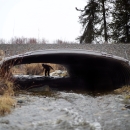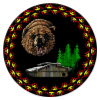States
CaliforniaThis project will replace two undersized culverts on Waukell Creek and its tributary Junior Creek in California. The Klamath River Estuary sloughs and tributaries, including Waukell Creek and Junior Creek on Resighini Rancheria Tribal lands, serve as vital rearing and winter habitat for threatened juvenile Coho salmon, steelhead trout, and coastal cutthroat trout originating from throughout the entire Klamath River Basin. The Tribe has been working to complete this project for over ten years to reopen access to critical habitats. In addition, these culverts fill with sediment and regularly flood, isolating the Resighini Rancheria community during and after major storm events. As the only road in and out of the community, it is essential to improve this infrastructure for maintained access to emergency services.
Project Quick Facts:
| Project Status | In Development |
| Location | CA, Del Norte County |
| NFPP Project Funding | $2,000,000 |
| Restoration Techniques | Culvert Replacement |
| Accomplishments | 42 Acres Reopened |
| Partner Project Lead | Resighini Rancheria |
The National Fish Passage Program combines technical expertise with a track record of success.
Implemented primarily through the Service's Fish and Wildlife Conservation Offices, the National Fish Passage Program provides financial and technical assistance to partners across the country. Since 1999, the program has worked with over 2,000 local communities, Tribes, and private landowners to remove or bypass over 3,400 barriers to fish passage fish passage
Fish passage is the ability of fish or other aquatic species to move freely throughout their life to find food, reproduce, and complete their natural migration cycles. Millions of barriers to fish passage across the country are fragmenting habitat and leading to species declines. The U.S. Fish and Wildlife Service's National Fish Passage Program is working to reconnect watersheds to benefit both wildlife and people.
Learn more about fish passage and reopen access to over 61,000 miles of upstream habitat for fish and other animals. Staff have expertise in fish migration and biology as well as financial, engineering, and planning assistance to communities, Tribes, and landowners to help them remove barriers and restore rivers for the benefit both fish and people.
Fish passage project proposals can be initiated by any individual, organization, government, or agency. However, proposals must be submitted and completed in cooperation with a Fish and Wildlife Conservation Office. (Please note that fish passage projects being used for federal or state compensatory mitigation or required by existing federal or state regulatory programs are not eligible for funding through the National Fish Passage Program.)
CONTACT A FISH PASSAGE COORDINATOR IN YOUR AREA TO GET STARTED.





